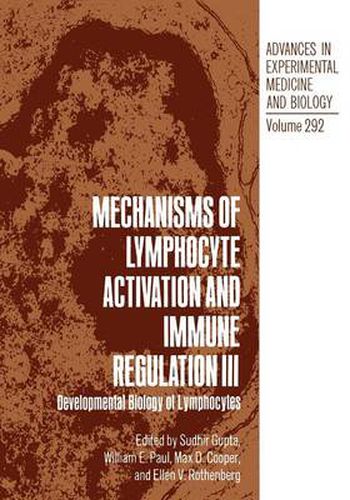Readings Newsletter
Become a Readings Member to make your shopping experience even easier.
Sign in or sign up for free!
You’re not far away from qualifying for FREE standard shipping within Australia
You’ve qualified for FREE standard shipping within Australia
The cart is loading…






This title is printed to order. This book may have been self-published. If so, we cannot guarantee the quality of the content. In the main most books will have gone through the editing process however some may not. We therefore suggest that you be aware of this before ordering this book. If in doubt check either the author or publisher’s details as we are unable to accept any returns unless they are faulty. Please contact us if you have any questions.
Recent advances in the understanding of the major events that shape the immune recog nition system have been remarkable. The analysis of immunoglobulin (Ig) gene organization and Ig repertoire diversification in lower vertebrates has provided new insight into this process in mammals. Similarly, the understanding of the early development of lymphocytes and of the acquisition of immunological tolerance has been aided by elegant studies in quail/chicken chimeras, using the power of the distinctive markers of the constitutive cells of these birds. Great strides have been made in understanding the role played by major histocompatibility complex (MHC) molecules in antigen presentation and in repertoire selec tion within the thymus. The use of transgenic mice expressing specific T-cell receptor (TCR) genes has elucidated the process of both positive and negative selection. In parallel, there has been considerable progress in our understanding of tolerance, based in part on the use of markers for the V fJ genes of T-cell receptors and in part on the analysis of the behavior of long term T-cell lines. This has led to the realization that both clonal deletion and clonal anergy may play critical roles in the maintenance of unresponsiveness to self antigen. Molecular analysis of the requirements for expression of membrane immunoglobulin molecules has revealed the existence of a complex that appears to be of critical importance in mediating signalling through Ig receptors. In addition, major insights have been obtained into the regulation of expression of genes of immunologic interest.
$9.00 standard shipping within Australia
FREE standard shipping within Australia for orders over $100.00
Express & International shipping calculated at checkout
Stock availability can be subject to change without notice. We recommend calling the shop or contacting our online team to check availability of low stock items. Please see our Shopping Online page for more details.
This title is printed to order. This book may have been self-published. If so, we cannot guarantee the quality of the content. In the main most books will have gone through the editing process however some may not. We therefore suggest that you be aware of this before ordering this book. If in doubt check either the author or publisher’s details as we are unable to accept any returns unless they are faulty. Please contact us if you have any questions.
Recent advances in the understanding of the major events that shape the immune recog nition system have been remarkable. The analysis of immunoglobulin (Ig) gene organization and Ig repertoire diversification in lower vertebrates has provided new insight into this process in mammals. Similarly, the understanding of the early development of lymphocytes and of the acquisition of immunological tolerance has been aided by elegant studies in quail/chicken chimeras, using the power of the distinctive markers of the constitutive cells of these birds. Great strides have been made in understanding the role played by major histocompatibility complex (MHC) molecules in antigen presentation and in repertoire selec tion within the thymus. The use of transgenic mice expressing specific T-cell receptor (TCR) genes has elucidated the process of both positive and negative selection. In parallel, there has been considerable progress in our understanding of tolerance, based in part on the use of markers for the V fJ genes of T-cell receptors and in part on the analysis of the behavior of long term T-cell lines. This has led to the realization that both clonal deletion and clonal anergy may play critical roles in the maintenance of unresponsiveness to self antigen. Molecular analysis of the requirements for expression of membrane immunoglobulin molecules has revealed the existence of a complex that appears to be of critical importance in mediating signalling through Ig receptors. In addition, major insights have been obtained into the regulation of expression of genes of immunologic interest.